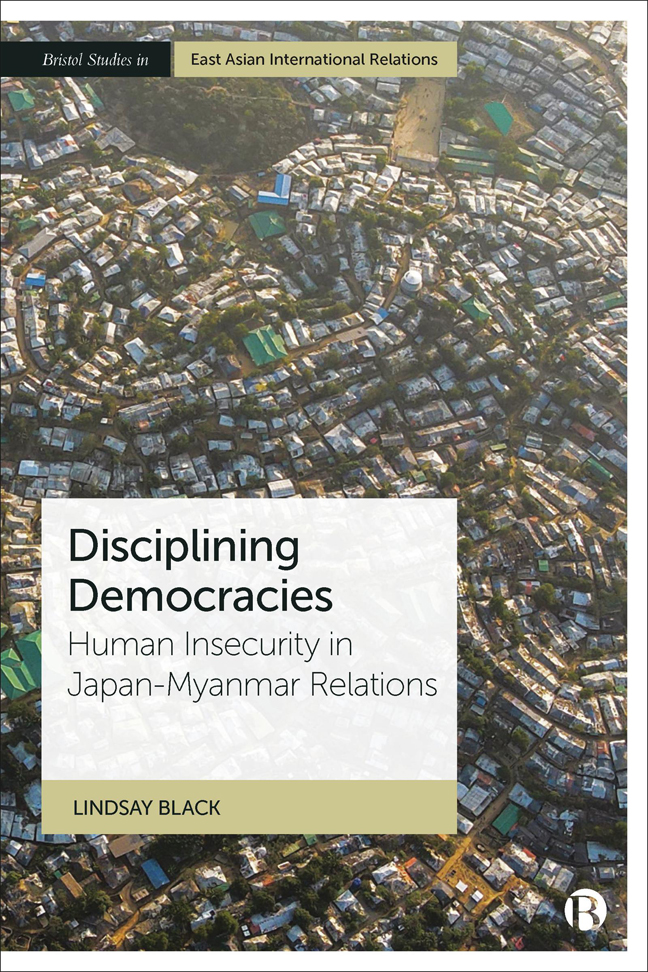Book contents
- Frontmatter
- Dedication
- Contents
- List of Abbreviations
- Acknowledgements
- Introduction
- 1 The Evolution of New Area Studies
- 2 ‘Asia's Liberal Leader’ and Human Insecurity
- 3 Japan as a ‘Bridge’: Facilitating Myanmar's Transition to a ‘Disciplined Democracy’
- 4 Japan and Special Economic Zones in Myanmar
- 5 Meddling for Profit: Japan's Peace-building Role in Myanmar
- 6 Dereliction of Responsibility: Japan's ‘Liberal Leadership’ in the 2016–20 Rakhine Crisis
- Conclusion: The Chimera of Progress
- Notes
- References
- Index
6 - Dereliction of Responsibility: Japan's ‘Liberal Leadership’ in the 2016–20 Rakhine Crisis
Published online by Cambridge University Press: 25 January 2024
- Frontmatter
- Dedication
- Contents
- List of Abbreviations
- Acknowledgements
- Introduction
- 1 The Evolution of New Area Studies
- 2 ‘Asia's Liberal Leader’ and Human Insecurity
- 3 Japan as a ‘Bridge’: Facilitating Myanmar's Transition to a ‘Disciplined Democracy’
- 4 Japan and Special Economic Zones in Myanmar
- 5 Meddling for Profit: Japan's Peace-building Role in Myanmar
- 6 Dereliction of Responsibility: Japan's ‘Liberal Leadership’ in the 2016–20 Rakhine Crisis
- Conclusion: The Chimera of Progress
- Notes
- References
- Index
Summary
Introduction
On 9 October 2016, ARSA attacked a number of border posts on the Myanmar–Bangladesh border, killing ten police and seven soldiers (Ware and Laoutides, 2018: 49–50). The Tatmadaw reacted quickly, engaging in ‘area clearance operations’ that would last until February 2017, resulting in widespread human rights abuses that were widely condemned by the international community (Ware and Laoutides, 2018: 54–5). Aung San Suu Kyi's government responded cautiously, refusing to condemn the military, but referring the situation to the Advisory Commission on Rakhine State, chaired by Kofi Annan, which she had already set up on 23 August 2016. The October 2016 attacks therefore signalled a significant escalation of the situation in Rakhine.
Tensions again rose over the summer of 2017, with the Tatmadaw undertaking further ‘area clearance operations’ in response to ARSA attacks against Rakhine Buddhist civilians in June. On 24 August, the Advisory Commission on Rakhine State released its report, which detailed measures designed to address the crisis relating to economic development, human rights, citizenship and security. The Myanmar government swiftly agreed to take on board the Commission's findings ‘to the fullest extent, and within the shortest timeframe possible’, raising hopes that peace might be possible in the Rakhine (Simpson, 2017). The same evening, in a move widely believed to be planned to coincide with the publication of the report, ARSA launched further strikes against 30 police posts and an army base in northern Rakhine state, killing a dozen security personnel (Simpson, 2017; Ware and Laoutides, 2018: 52). The Myanmar government responded by labelling ARSA a ‘terrorist organization’ under the country's new Anti-Terror Law and the Tatmadaw intensified its ‘clearance operations’ that the UN High Commissioner for Human Rights described as ‘a textbook example of ethnic cleansing’ (Simpson, 2017). By January 2018, the UN reported that nearly 690,000 Rohingya had fled Myanmar in what had become Asia’s largest humanitarian crisis. Though all sides in the conflict are likely to have committed atrocities, the main body of evidence and eye-witness accounts points to the Tatmadaw as responsible for the majority of crimes against humanity (Ware and Laoutides, 2018: 55–7).
- Type
- Chapter
- Information
- Disciplining DemocraciesHuman Insecurity in Japan-Myanmar Relations, pp. 126 - 152Publisher: Bristol University PressPrint publication year: 2023



